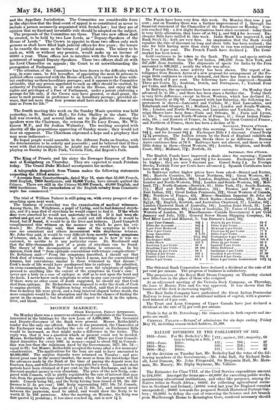The trial of William Palmer is still going on, with
every prospect of en- croaching upon next week.
The business of yesterday was the examination of medical witnesses. Among them, Dr. Wrightson, a pupil of Liebig, said he had detected
• , and if a man died of strychma he would expect to find it. If the whole
dose were absorbed he would not undertake to find it. If it had been ab- sorbed and got out of the stomach, he could not tell whether it would be found, but if found, it would be in the liver and kidneys. [Lord Campbell complimented this witness on the manner in which he gave his evi- dence.] Mr. Partridge said, that some of the symptoms in Cook's case are consistent and others inconsistent with strychnine tetanus. Mr. John Gay said, it would be very difficult from merely seeing symptoms of tetanus, and, in the absence of all knowledge as to how it was oc- casioned, to ascribe to it any particular cause. Dr. Macdonald said that the fifty-thousandth part of a grain of strychnia can be found. The theory of the decomposition of strychnia is erroneous. In his opinion, Cook died " from epileptic convulsions with tetanic complications." Dr. Robinson said-" From the symptoms described, I should say that Cook died of tetanic convulsions; by which I mean not the convulsions of tetanus, but convulsions similar to those witnessed in that disease." Cook's mode of life would have predisposed him to epilepsy. He admitted, on cross-examination, that he " had never seen the symptoms of epilepsy proceed to anything like the extent of the symptoms in Cook's case. I never saw a body in a case of epilepsy so stiff as to rest upon the head and the heels. I never knew such symptoms to arise in any case except tetanus." If there were no other cause of death suggested, he should say that Cook died from epilepsy. Dr. Richardson was disposed to refer the death of Cook to angina pectoris. Dr. Wrightson being recalled, said that if a minimum dose to destroy life were given, and a long interval elapsed before death, the more complete would be the absorption and the less the chance of finding the agent in the stomach ; but he should still expect to find it in the splm, liver, and blood.


































 Previous page
Previous page